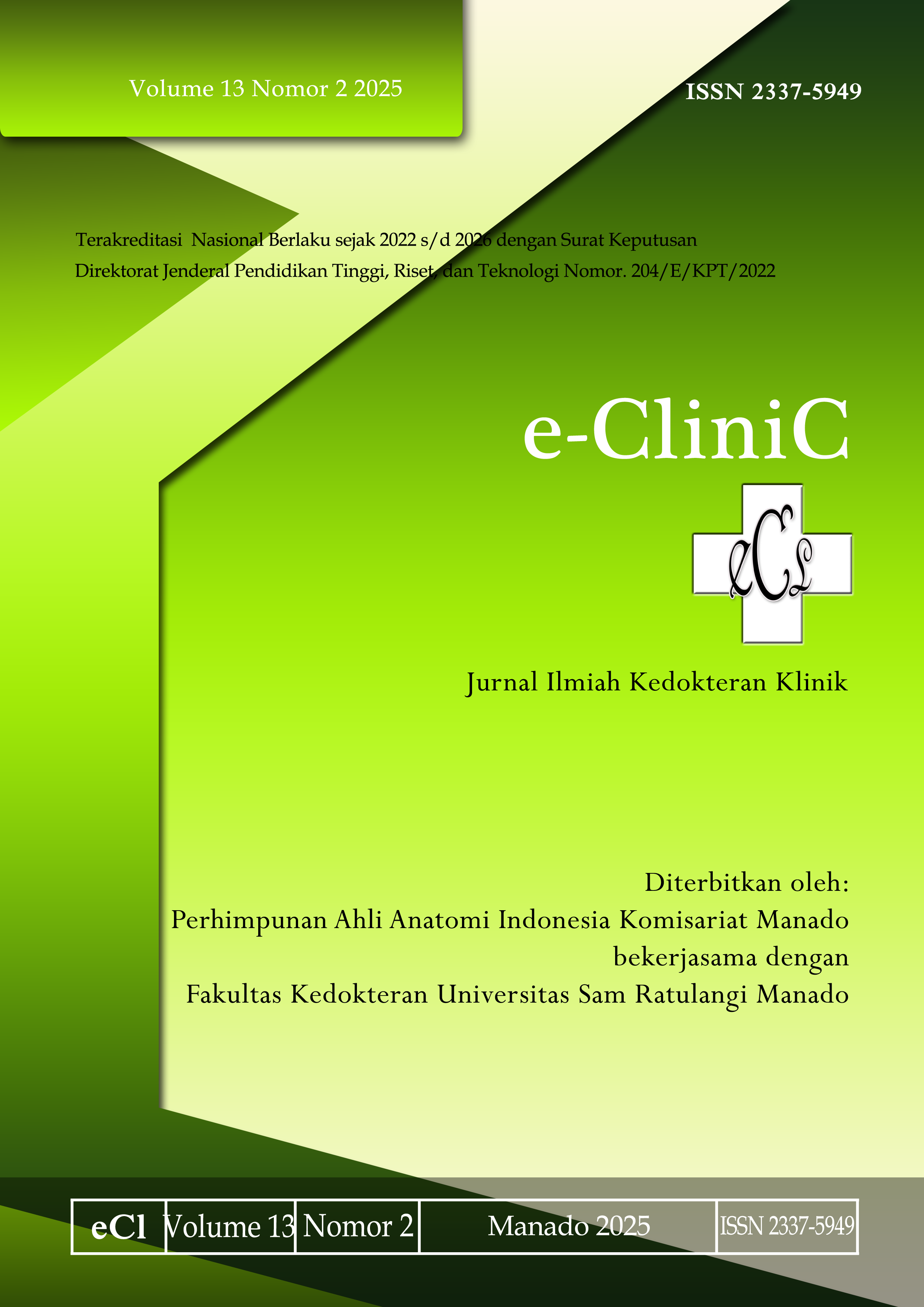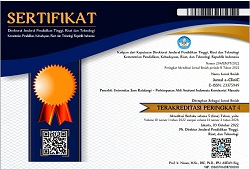Ovarian Cyst Torsion: A Case Report
DOI:
https://doi.org/10.35790/ecl.v13i2.61259Abstract
Abstract: Accidents involving ovarian cysts might include cyst rupture, hemorrhage, and torsion. Any girl who has abdominal pain or a pelvic or abdominal mass should be evaluated for ovarian torsion, a rare issue in the juvenile age group. We reported a 10-year-old girl presented with complaints of lower left abdominal pain that began three days prior to her hospital admission. Initially, the pain was intermittent but subsequently became persistent and intensified, with no pain-free intervals. CT-Scan of the abdomen – pelvis without contrast revealed cystic mass with fat components and intralesional calcification, in the suprapubic quadrant. The impression came from the ovary (difficult to determine the right/left ovary), which urged the bladder to the anteroinferior and urged the uterus to the posterior, suspected of mature cystic ovarian teratoma. The patient was managed with intravenous fluids (IVFD), antibiotics, and analgesics for pain control. Due to the high suspicion of ovarian torsion, emergency exploratory laparotomy was performed. Anatomical differences in the paediatric population and their effects on surgery were also be considered. Intraoperative findings confirming a left ovarian cyst measuring approximately 8 x 6 x 4 cm, which had undergone torsion twice. Detorsion was performed, and the ovary was found to be viable. Cystectomy was carried out, preserving healthy ovarian tissue. The right ovary appeared normal. In conclusion, this case underscores the importance of timely surgical intervention, even beyond the traditional "golden period" of 6–12 hours, as collateral blood supply may help maintain ovarian viability. The shift from oophorectomy to ovarian preservation in the management of ovarian torsion reflects evolving clinical practices, emphasizing better reproductive and long-term health outcomes. Early recognition, prompt imaging, and surgical intervention are crucial to preserving ovarian function and improving patient prognosis. This case also highlights the need for increased awareness of ovarian torsion in pediatric and adolescent populations, given its rarity and diagnostic complexity.
Keywords: torsion cyst; ovarian cyst; paediatric surgery
References
Hartge P, Hayes R, Reding D, Sherman ME, Prorok P, Schiffman M, et al. Complex ovarian cysts in postmenopausal women are not associated with ovarian cancer risk factors: preliminary data from the prostate, lung, colon, and ovarian cancer screening trial. Am J Obstet Gynecol. 2000;183(5):1232-7. Doi: 10.1067/mob.2000.107401
Cass DL. Ovarian torsion. Semin Pediatr Surg. 2005;14(1):86-92. Doi: 10.1053/j.sempedsurg.2005.01.003
Oelsner G, Shashar D. Adnexal torsion. Clin Obstet Gynecol. 2006;49(3):459–63. Doi: 10.1097/00003081-200609000-00006
Gupta N, Dadhwal V, Deka D, Jain SK, Mittal S. Corpus luteum hemorrhage: rare complication of congenital and acquired coagulation abnormalities. J Obstet Gynaecol Res. 2007;33(3):376–80. Doi: 10.1111/j.1447-0756.2007.00540.x
Payne JH, Maclean RM, Hampton KK, Baxter A, Makris M. Haemoperitoneum associated with ovulation in women with bleeding disorders: the case for conservative management and the role of the contraceptive pill. Haemophilia. 2007;13(1):93–7. Doi: 10.1111/j.1365-2516.2006.01399.x
Kokoska ER, Keller MS, Weber TR. Acute ovarian torsion in children. Am J Surg. 2000;180(5):462–5. Doi: 10.1016/S0002-9610(00)00503-1
Huang TY, Lau BH, Lin LW, Wang TL, Chong CF, Chen CC. Ovarian cyst torsion in a toddler. Am J Emerg Med. 2009;27(5):632.e1–632.e3. Doi: 10.1016/j.ajem.2008.09.005
Winton C, Yamoah K. Ovarian torsion and laparoscopy in the paediatric and adolescent population. BMJ Case Rep. 2020;13(5):e232610. Doi: 10.1136/bcr-2019-232610
McWilliams GD, Hill MJ, Dietrich CS 3rd. Gynecologic Eemergencies. Surg Clin North Am. 2008;88(2):265-283. Doi: 10.1016/j.suc.2007.12.007
Anders JF, Anders JF, Powell EC. Urgency of evaluation and outcome of acute ovarian torsion in pediatric patients. Arch Pediatr Adolesc Med. 2005;159(6):532-5. Doi: 10.1001/archpedi.159.6.532
Mahonski S, Hu KM. Female nonobstetric genitourinary emergencies. Emerg Med Clin North Am. 2019; 37(4):771-84. Doi: 10.1016/j.emc.2019.07.012
Herter LD, Golendziner E, Flores JAM, Becker E, Spritzer PM. Ovarian and uterine sonography in healthy girls between 1 and 13 years old: correlation of findings with age and pubertal status. AJR Am J Roentgenol. 2002;178(6):1531–6. Doi: 10.2214/ajr.178.6.1781531
Kass-Wolff J, Wilson E. Pediatric gynecology: assessment strategies and common problems. Semin Reprod Med. 2003;21(4):329–38. Doi: 10.1055/s-2004-815589
Medeiros LRF, Rosa DD, Bozzetti MC, Fachel JMG, Furness S, Garry R, et al. Laparoscopy versus laparotomy for benign ovarian tumour. Cochrane Database Syst Rev. 2009;2:CD004751. Doi: 10.1002/14651858.CD004751.pub3
Cass DL. Ovarian torsion (review). Semin Pediatr Surg. 2005;14(2):86-92. Doi: 10.1053/j.sempedsurg.2005.01.003
Downloads
Published
How to Cite
Issue
Section
License
Copyright (c) 2025 Harsali Lampus, Leo Rendy, Candy Candy, Andy Rangan

This work is licensed under a Creative Commons Attribution-NonCommercial 4.0 International License.
COPYRIGHT
Authors who publish with this journal agree to the following terms:
Authors hold their copyright and grant this journal the privilege of first publication, with the work simultaneously licensed under a Creative Commons Attribution License that permits others to impart the work with an acknowledgment of the work's origin and initial publication by this journal.
Authors can enter into separate or additional contractual arrangements for the non-exclusive distribution of the journal's published version of the work (for example, post it to an institutional repository or publish it in a book), with an acknowledgment of its underlying publication in this journal.
Authors are permitted and encouraged to post their work online (for example, in institutional repositories or on their website) as it can lead to productive exchanges, as well as earlier and greater citation of the published work (See The Effect of Open Access).







